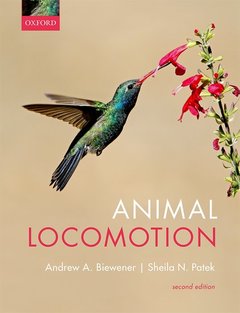Animal Locomotion (2nd Ed.)
Langue : Anglais
Auteurs : Biewener Andrew, Patek Sheila

Animals have evolved remarkable biomechanical and physiological systems that enable their rich repertoire of motion. Animal Locomotion offers a fundamental understanding of animal movement through a broad comparative and integrative approach, including basic mathematics and physics, examination of new and enduring literature, consideration of classic and cutting-edge methods, and a strong emphasis on the core concepts that consistently ground the dizzying array of animal movements. Across scales and environments, this book integrates the biomechanics of animal movement with the physiology of animal energetics and the neural control of locomotion. This second edition has been thoroughly revised, incorporating new content on non-vertebrate animal locomotor systems, studies of animal locomotion that have inspired robotic designs, and a new chapter on the use of evolutionary approaches to locomotor mechanisms and performance.
Andrew Biewener is the Charles P. Lyman Professor of Biology and Director of the Concord Field Station at Harvard University. He is Deputy Editor-in-Chief of The Journal of Experimental Biology and served as an Editorial Board member of Biological Letters. Biewener's laboratory focuses on the biomechanics and neuromuscular control of terrestrial and aerial locomotion of vertebrate animals, with relevance to biorobotics and biomedical engineering. He has published over 155 primary research papers, and trained 18 PhDs and 16 post-doctoral fellows. He teaches courses on Comparative Evolutionary Physiology, Comparative Biomechanics and The Biology of Movement, and has helped to co-author the biology textbook, How Life Works (Macmillan Press, 2016). Sheila Patek is Associate Professor in Biology at Duke University. Patek's lab focuses on the interface of physics and evolution in organismal systems, especially through the evolution of acoustic mechanisms and fast movements in arthropods. She is a Monitoring Editor at The Journal of Experimental Biology and Associate Editor at the journal Evolution. She has taught courses in Marine Invertebrate Biology, How Organisms Move, Introductory Biology and Animal Physiology. Patek received her A.B. with honors in Biology from Harvard University followed by a Ph.D. in Biology from Duke University. She was then awarded a Miller Postdoctoral Fellowship at UC Berkeley. She has received several honors, including a Guggenheim Fellowship, the George A. Bartholomew Award for distinguished contributions to comparative physiology, a Radcliffe Fellowship, a NSF CAREER award, and the Brilliant 10 award from Popular Science magazine.
Date de parution : 04-2018
Ouvrage de 236 p.
19.6x24.9 cm
Disponible chez l'éditeur (délai d'approvisionnement : 21 jours).
Prix indicatif 127,71 €
Ajouter au panierDate de parution : 04-2018
Ouvrage de 236 p.
19x24.7 cm
Thèmes d’Animal Locomotion :
© 2024 LAVOISIER S.A.S.



